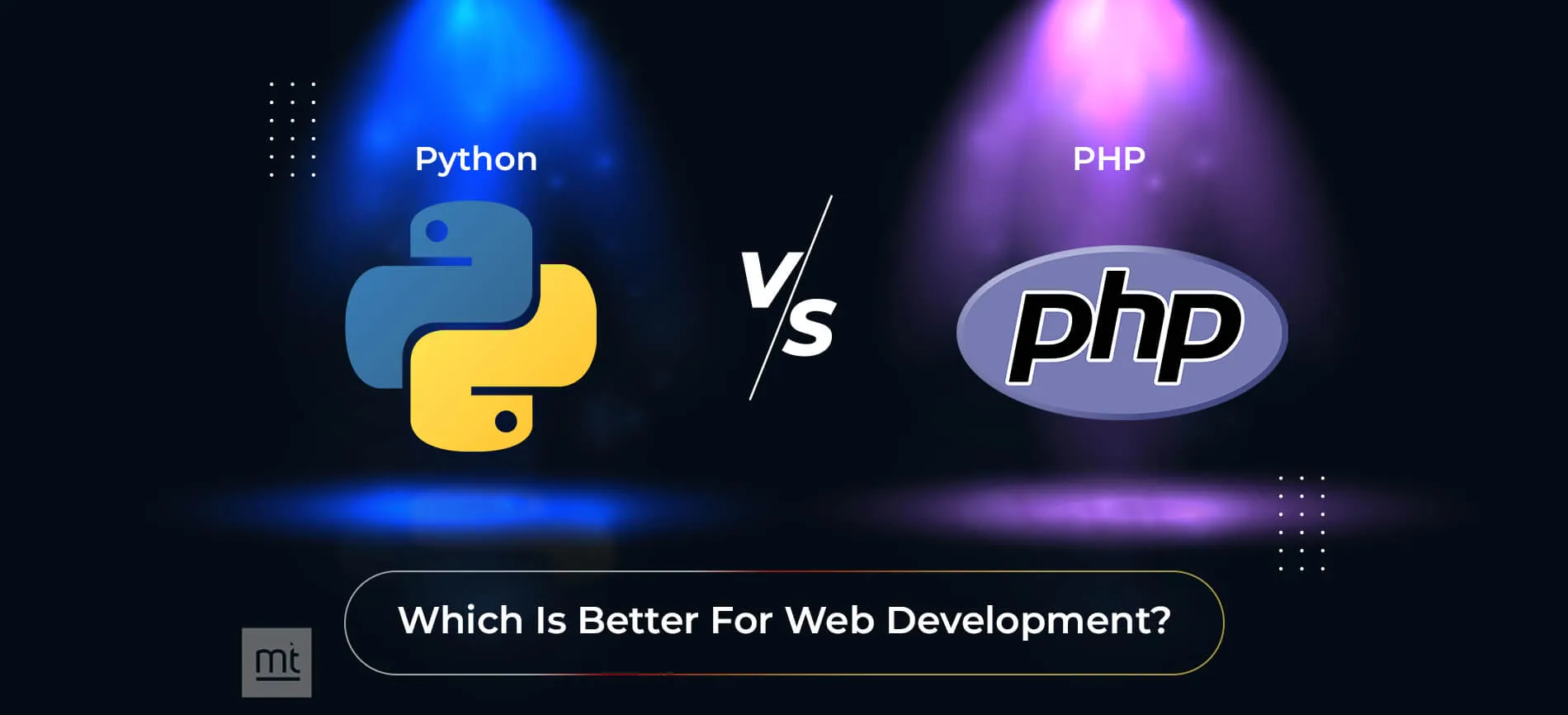Introducation:
The technology trends are evolving fast. Businesses are looking for opportunities and languages that help them accommodate these changes and create a unique brand identity. New programming languages have been making their way into the market with different benefits to these businesses. But, Python is a prevalent programming language with many features, APIs, and functions.
Python offers many advantages for the flexibility and scalability of the applications. This has made it a sought-after programming language for Android app development. Python is being used for all sorts of development, from python web development to android app development. This is the reason that businesses are ready to hire Python developers.
As of Jan 2025, Python is the No. 1 programming language and it covers more than 16 percent share, according to the TIOBE Index report. Besides, another study revealed that more than 84 percent of developers prefer to use Python language for app development.
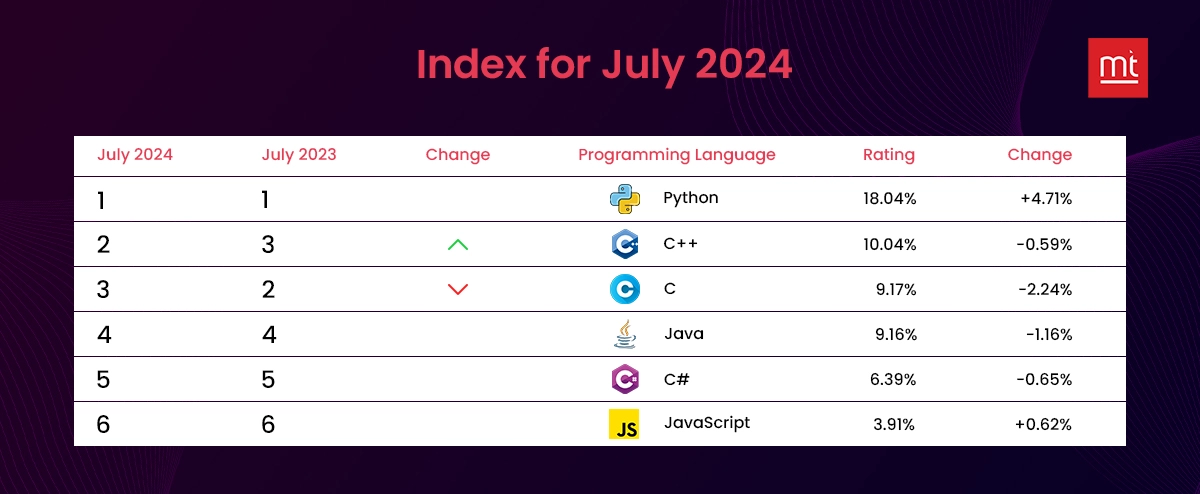
What makes Python even more interesting is the variety of Python tools for android app development and the range of applications it can build easily.
Types of Applications Developed Using Python
Let us check out the variety of applications that can be developed using Python.
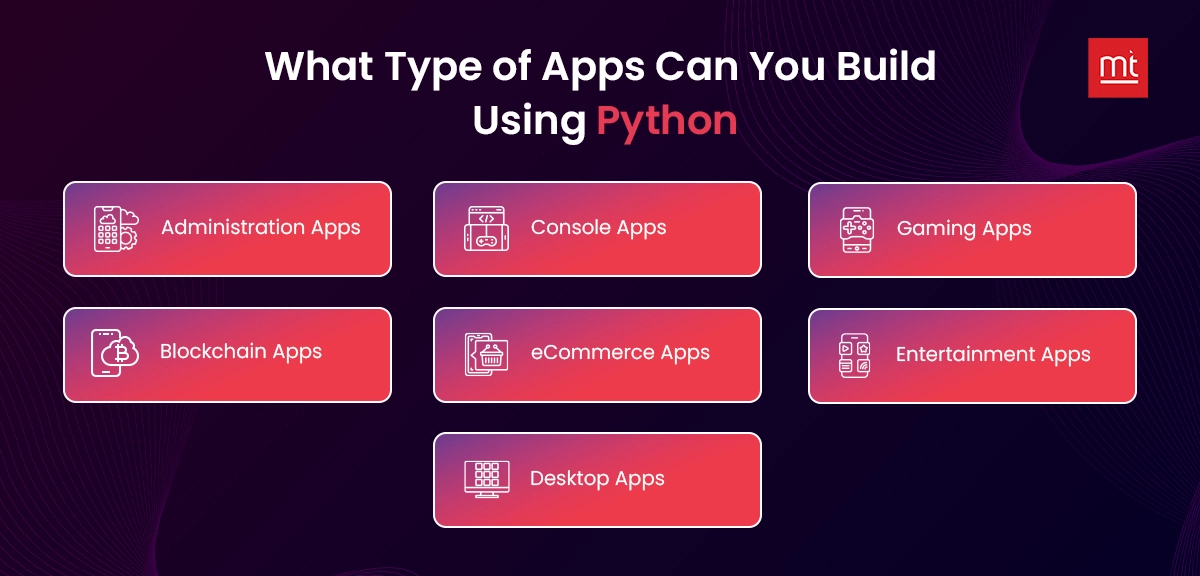
1. Administration Applications
Python is an efficient device management system and lets developers utilize the operating system’s OS module. This program is an ideal option to build professional and high-performing administration apps.
2. Console Application
Console applications utilize text to carry out a task. That’s why most companies use this program as console applications to have a faster interface and can work perfectly without much user interaction. As a widely used CLI language, Python lets users communicate with various systems. Users can also use Python libraries for Android app development and plugins to enhance the functionalities.
3. Gaming Applications
Python is an easy programming language to learn and use, most developers prefer creating code and developing modern gaming apps using it. The best thing is that when you use Python for Android app development, it offers better scalability.
4. Blockchain Applications
Undoubtedly, blockchain has become a trending technology in different industries and Python has made it easier to take advantage of this technology by offering frameworks like Flask. Using this, one can easily connect to Blockchain technology through the Internet.
5. E-Commerce Application
If you are planning to create a perfectly optimized e-commerce app, then opt for Python. One of the major reasons for this is Python’s security features. They keep important data safe from phishing attacks and SQL injections.
6. Entertainment Applications
When it comes to creating an entertainment app, most developers prefer to go for Python. It has been the first choice of well-known platforms like Spotify, YouTube, Netflix, and Google.
7. Desktop Applications
Desktop apps, created using Python always demonstrate better usability, efficiency, and scalability. It also allows developers to easily integrate data analytics and AI in desktop apps.
If you are still wondering if Is Python good for Android app development, then the answer is Yes. This is one of the most modified and customizable programming languages that can be used for almost all types of applications. Let us look at the top 10 python tools helpful in android app development.
10 Python Tools That Empower Android App Development
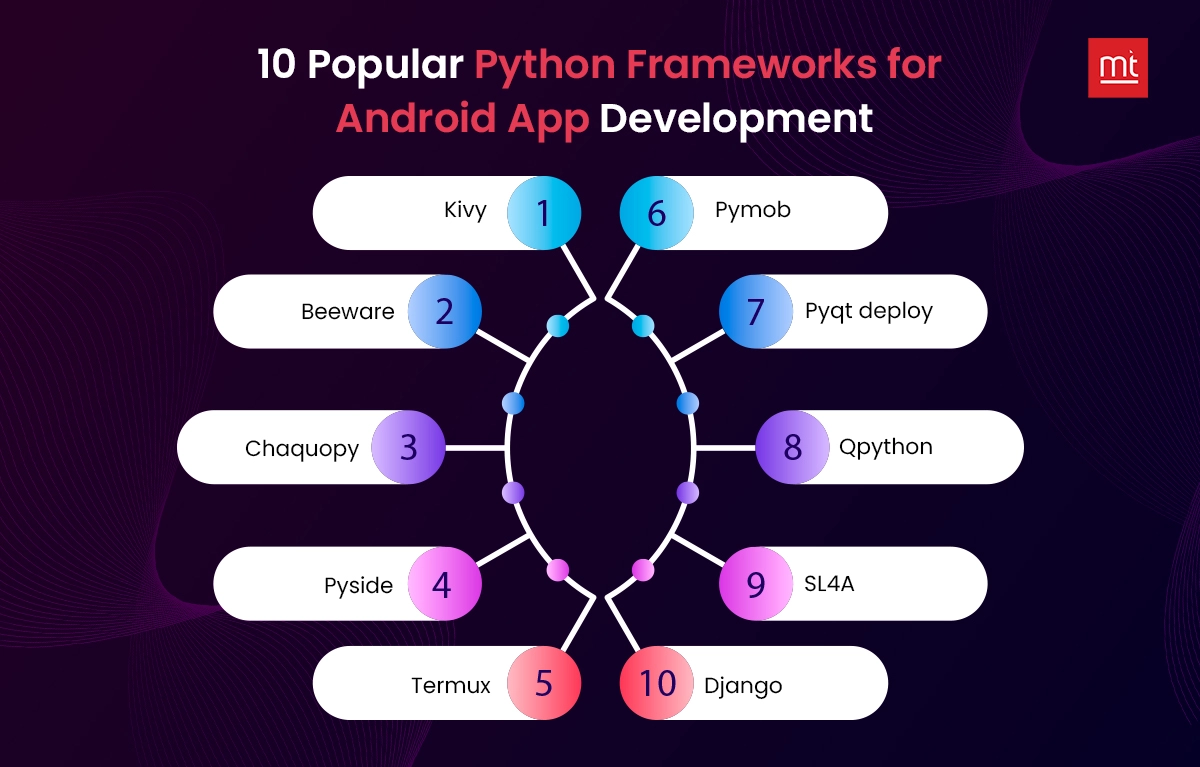
#1. Kivy
Kivy is one of the popular python tools for android app development. This tool was released in 2011 for Python developers to develop innovative mobile apps for multiple platforms, including Android, Linux, and macOS. KIVY is an open-source tool with Natural User Interface (NUI). It has many UI functions and a powerful library for developing cross-platform apps.
Key Features of Kivy:
- A great open-source Python tool with the availability of OpenGL ES 2.
- Provides multitouch extensions, including mouse and keyboard for the OS.
Pros of Kivy:
- Completely free to use.
- Offers multi-platform support.
- Has widgets to support multi-touch.
Cons of Kivy:
- Some users may find the user interface a little complex.
- Framework’s package size is very large and can take hours to download.
- Poor community support
#2. Beeware
Beeware is a widely used python tool for Android app development. It is used to develop applications for multiple platforms, including iOS, Linux, Windows, Android, and macOS. Beeware is famous for open-source development, and the entire community of developers can modify the Beeware suite.
Key Features of Beeware:
- Allows developers to use native UI elements for a native feel and look.
- It comes equipped with many specialized tools.
- A community-driven and open-source tool.
Pros of Beeware:
- Better native UI experience
- Great community support
- BSD licensed (free to use)
Cons of Beeware:
- As it is a new tool, developers may need to work more due to bugs.
- Complex learning curve
- Limited customizations for UI elements
- Lacks of resources
3. Chaquopy
It is a Python SDK that can be used for Android app development. Using this tool, the developers can use different programming languages, including Kotlin and Python, to develop an Android application. It can be directly integrated with Android Studio. Developers get both options – using Java API for android app development and using Python API for android app development. It is also relatively easy for Android developers to start using Chaquopy. They can install it as a third-party plugin in Android Studio.
Key Features of Chaquopy:
- It offers easy-to-use APIs to source Python code from Kotlin/Java.
- It provides developers with many third-party Python packages like TensorFlow, OpenCV, SciPy, and more.
- Integrates with Gradle build system Android Studio.
Pros of Chaquopy:
- Good for making the development process faster
- Easy to use and install
- Makes coding easier by offering various tools
Cons of Chaquopy:
- Small Chaquopy community
- Challenging to find detailed guides for Python app development
4. PySide
PySide is a cross-platform GUI toolkit that can be used for free. This open-source framework allows you to share your views and report bugs freely. In addition, it offers a primary widgets-based UI that can be used to create attractive android applications. The PySide 2 module contains all the python bindings necessary for developing an application. The application developers use three main modules – Qt Core, Qt GUI, and Qt Widgets to use different GUI and visual elements.
Key Features of PySide:
- It provides app developers access to the Qt 4.8 framework.
- It can help in generating required bindings for C++ libraries.
- It is compatible with HTML, CSS, and JavaScript.
Pros of PySide:
- Represents the official set of Python bindings that are backed by the Qt Company.
- LGPL licensed
Cons of PySide:
- To use it, developers must have extensive C++ knowledge
- Lack of documentation makes it difficult to learn its insights.
5. Termux
Termux is a popular Android terminal used by app developers and the android app testing community. This tool provides terminal access to Android OS and a fully functional Linux environment for the developers to work on. Using Termux, the developers can access many Linux features, including Secure ssh access for servers, various Linux shells, different programming languages including Perl and Python, and support for external keyboard and mouse.
Key Features of Termux:
- It offers an extensive collection of Linux packages.
- Using this, you can reduce the app size on the Google Play Store.
- The emulator has a robust package management system.
Pros of Termux:
- Lets users add their desired packages
- Supports multiple plugins
- Various terminal shell options
Cons of Termux:
- Difficult learning curve
- Requires technical knowledge to use the software.
6. PyMob
Developers use PyMob to develop mobile apps. Using this framework, the developers can create applications for multiple platforms, including Windows, iOS, and android. It has excellent documentation, which makes it easy to learn and use. The framework contains the library for accessing the mobility parameter and related database. It is known to be a very convenient platform for use where the developers can use a lot of data for app specifications.
Key Features of PyMob:
- It offers a uniform interface to describe models.
- It has MobUI that lets developers create responsive UI.
- It can be used to make modern and highly optimized apps.
Pros of PyMob:
- Allows to write web apps in Python.
- Create app features once and use them as many times as you want.
- Facilitates a quicker way to create a model using repetitive tasks
Cons of PyMob:
- In some cases, the code may not work fast.
- Developers may not use their own tools.
7. PYQT Deploy
As the name suggests, PYQT deploy is a tool used to deploy apps created using Python versions. PYQT app supports both – mobile and desktop apps. It offers distributable packages specific to the platform. It is a great app development tool for its GUI and Android API integration. The android developers use it to develop native android applications.
Key Features of PYQT Deploy:
- A great deployment tool for developing to deploying PyQt-based applications written using Python 3.5 version or higher.
- It facilitates easy deployment to mobile as well as desktop platforms.
- It has plugins for Python standard, OpenSSL, PyQt, and more.
Pros of PYQT Deploy:
- BSD licensed
- Can run on mobile devices, Windows, MacOS, and Linux
- Less requirement for third-party dependencies
Cons of PYQT Deploy:
- Can be very challenging for beginners
- It has incomplete and poor Python documentation
8. QPython
QPython allows the developers to run python scripts on Android devices. It comes with different application framework support, including a library, console, interpreter, and editor. It also has many SL4A libraries. Runtime mode for android devices, UI toolkit, Q Mode & Web app mode, and standard library support are some of the benefits offered by QPython.
Key Features of QPython:
- It comes with multiple SL4A libraries and supports a UI toolkit, runtime mode, and more.
- It supports almost every standard Python library.
- Using this, one can easily add libraries important for the development project.
- It offers useful features like Android API access which is not available with Python.
Pros of QPython:
- Facilitates support to Kivy
- Can easily handle many runtimes for Android
- Allows developers to use popular Python libraries for app development
Cons of QPython:
- Some modules may not work with Android
- May affect the user experience of the app’s existing features
9. SL4A
SL4A, also known as The Scripting Layer for Android, is a popular Python library that can be used to create scripts for the Android platform. It supports many scripting languages such as PHP, Perl, JRuby, and more.
Key Features of SL4A:
- Helps developers to create mobile apps that can be released onto the Google Play Store without any hassle.
- Works perfectly with Ruby, JavaScript, and other programming language interpreters.
Pros of SL4A:
- Facilitates smooth integrations
- Perfect for Android app development
- Helps release Python-based apps directly to the Play Store.
Cons of SL4A:
- The learning curve is complex as some attributes have different names.
- Small community
- The scripting layer is not created by Google
10. Django
When it comes to choosing the Best Python framework for Android App Development, you can’t ignore Django. It is a popular full-stack Python framework among web or app developers who are using Python. It reduces the web development process and provides developers with many useful tools for logging, caching, data validation, etc.
Key Features of Django:
- It runs on all platforms, including MAC, Linux and Windows.
- The framework functions as a catalyst in a data-driven and complex development process, making it easier and faster.
- It comes with equipment with all the things, like tools and libraries required to create web apps.
- Django can help developers generate SEO-friendly URLs.
Pros of Django:
- Better scalability and speed
- Open-source nature with a massive Django community
- Offers better security with XSS, SQL injection protection, CSRF, and more.
Cons of Django:
- May not be an ideal option for simpler development projects
- Can lead to a slow website
- Lack of convention
Advantages of using Python for Android App Development
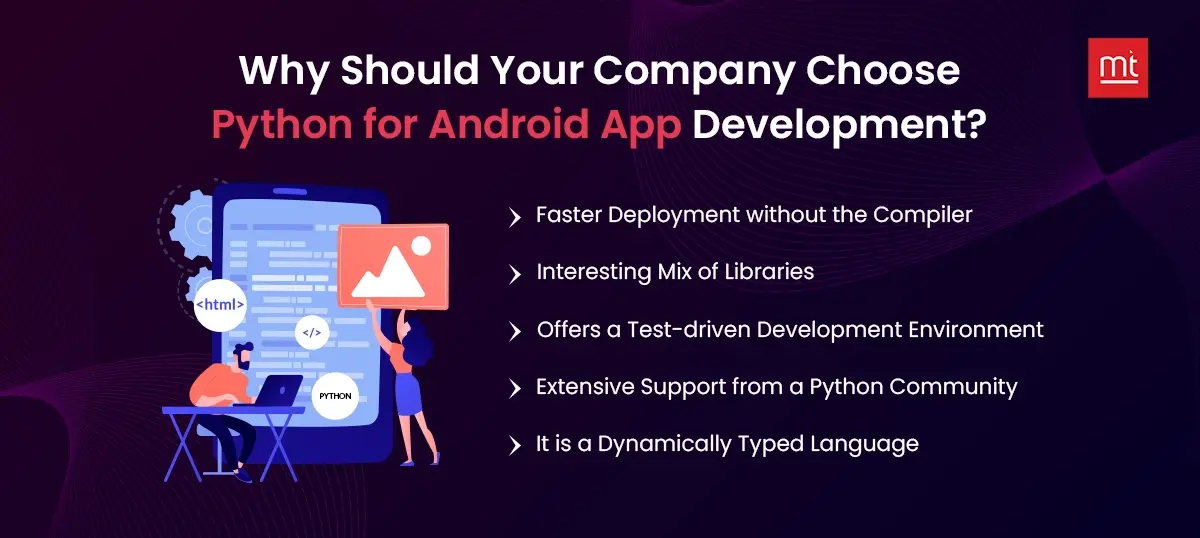
Faster Deployment without the Compiler
Time-to-market plays an important in the process of app development. Python doesn’t have any compiler and it executes the app directly using an interpreter. That means, writing Android apps using this program will be faster as well as reliable.
Interesting Mix of Libraries
Python provides developers with various libraries along with pre-built codes. Using these, they can boost the app development process. These libraries can also help in creating user-friendly interfaces and integrating the use of full features.
Offers a Test-driven Development Environment
When using Python for app development, it is possible to test every stage of the app development. As a result, a company can expect to get a high-performance and quality mobile app without any bugs.
Extensive Support from a Python Community
Undoubtedly, Python has a vast community. Every member of the community has identified various new codes and integrated them into the libraries to help others enjoy a better and faster development process. Besides, one can easily find many tutorials and documentation related to app development in this community.
It is a Dynamically Typed Language
Python is one of the best programming languages for app development as it is a dynamically typed programming language. Due to this, it allows better flexibility in programming. The program doesn’t know the variable type until developers run the code.
Conclusion
Python has been successfully used to develop android apps. It is a trustworthy and reliable android application development language. There are just eight tools, and many other python tools can help you develop an android application from scratch. These tools will help you fasten the development process and reduce the hassles in debugging and maintaining the application. Businesses should contact an Android development company to hire android app developers or python developers to integrate the best python tools and develop a robust android application.
About Author
Subscribe to Our Newsletter!
Join us to stay updated with our latest blog updates, marketing tips, service tips, trends, news and announcements!




